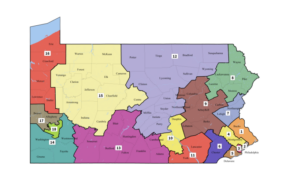Blog Post
Pennsylvania Deserves an Independent Redistricting Committee
Redistricting reform in Pennsylvania is long overdue. In the 2020 redistricting cycle, we graded Pennsylvania’s process a C+. While the state showed significant improvements in the state legislative redistricting process, the state’s congressional redistricting process was less transparent. Things got so messy that ultimately, the state supreme court had to step in and implement a state map. You can learn more about the challenges of the 2020 process here.
NEW: Pennsylvania received a C+ in @CommonCause‘s national redistricting report. Find out why here 👀https://t.co/SfuX0Edu4Q
— Common Cause PA (@commoncausepa) October 11, 2023
Pennsylvanians deserve better. That’s why we want to implement an Independent Citizen Redistricting Commission ahead of the 2030 Redistricting Cycle.
What is an Independent Citizen Redistricting Commission?
Independent citizen redistricting commissions aim to keep political power in the hands of the people, not politicians. They are groups of people chosen to draw voting maps completely independent of legislators and political parties. These commissions are significantly more likely to seek public feedback and integrate it into voting maps. This reform helps to create fair voting representation, in which all Pennsylvanians have an equal say in our democracy. The structure of these commissions varies by state.
What could that look like for Pennsylvania?
We’re supporting the Fair Districts Amendment, a proposal to create an Independent Redistricting Commission to handle redistricting for both the Congressional and Pennsylvania General Assembly Maps. The new maps would be drawn by a randomly selected group of eleven pre-qualified voters from both major political parties, plus independents and third-party members. Commissioners and their spouses could not have been lobbyists, political operatives, or Federal or state employees within five years of their appointment to the Commission. Seven of the eleven members would need to approve every map.
The bill also includes requirements to assure transparency in the redistricting process, with multiple opportunities for public input, and clear standards for the Commission to ensure fair maps.

How does redistricting happen in Pennsylvania right now?
The state legislature draws congressional maps, which are subject to a veto by the governor. This process was unsuccessful in the last cycle and required intervention from the state supreme court.
A commission of politicians draws the Pennsylvania General Assembly’s maps. The 2021 commission included the caucus floor leaders from the state house and state senate and a member appointed by the state supreme court.
Do other states use Independent Citizen Redistricting Commissions?
Yes! 4 states and 82 districts in the United States use Independent Redistricting Commissions: Arizona (9), California (52), Colorado (8), and Michigan (13). While many states are still dealing with lawsuits related to redistricting, California had zero lawsuits after its 2021 redistricting cycle.
Common Cause is creating a more reflective democracy in Pennsylvania by working to end gerrymandering through fair maps drawn by an independent commission.
For updates, follow us on X [Twitter], Instagram, Threads, Facebook, and TikTok.